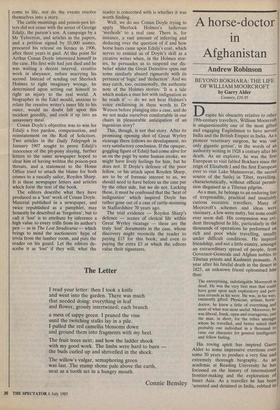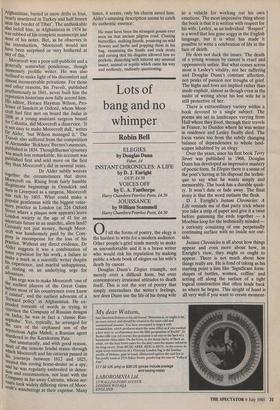A horse-doctor in Afghanistan
Andrew Robinson
BEYOND BOKHARA: THE LIFE OF WILLIAM MOORCROFT by Garry Alder
Century, £16.95
Despite his obscurity relative to other 19th-century travellers, William Moorcroft is unquestionably one of the most gifted and engaging Englishmen to have served India and the British Empire in India. As a pioneer veterinary surgeon, he was 'our only gigantic genius', in the words of an authority writing in 1928 a century after his death. As an explorer, he was the first European to visit fabled Bokhara since the reign of Elizabeth I and the first European ever to visit Lake Mansarovar, the sacred source of the Sutlej in Tibet, travelling, characteristically, without official permis- sion disguised as a Tibetan pilgrim.
As a man, he belongs to an enduring line of irrepressible, practical and insatiably curious eccentric travellers. Many of Moorcroft's schemes and ideas were visionary, a few were nutty, but none could ever seem dull. His compassion was evi- dent throughout hs life, particularly in the thousands of operations he performed on rich and poor while travelling, usually under difficult conditions. He inspired friendship, and not a little enmity, amongst an extraordinary spread of people, front Governor-Generals and Afghan nobles to Tibetan priests and Kasluniri peasants. A year after his fateful death in the desert in 1825, an unknown friend epitomised hint thus:
The enterprising, indefatigable Moorcroft is dead. He was the very best man that could have gone upon such exploratory and peri- lous errands as his were. He was, in his way, eminently gifted. Physician, artisan, horse doctor, he knew a little of everything and most of what was most useful. Moreover, he was liberal, frank, open and courageous, just the man, in short, for the tribes amongst whom he travelled, and better suited than probably one individual in a thousand to raise our character for general intelligence and fellow feeling.
His roving spirit has inspired Garry Alder to some impressive exertions over some 30 years to produce a very fine and extremely thorough biography. As an academic at Reading University he has focussed on the history of international frontier-making and the exploration of Inner Asia. As a traveller he has been' 'arrested and detained in India, robbed in Afghanistan, buried in snow drifts in Iran, nearly murdered in Turkey and half frozen near the border of Tibet'. The unthinkable also befell him; in Afghanistan in 1974 he Was robbed of his complete manuscript and most of his notes. But, as he observes in the introduction, `Moorcroft would not have been surprised or very bothered at any of this.'
Moorcroft was a poor self-publicist and a generally somewhat ponderous, though immensely prolific writer. He was also inclined to make light of his discomfort and almost inconceivable privations. For those and other reasons, his Travels, published Posthumously in 1841, never built him the reputation historians now fully accord him. His editor, Horace Hayman Wilson, Pro- fessor of Sanskrit at Oxford, whom Moor- Croft had first met on board the Indus in 1808 as a young assistant surgeon bound for Calcutta, did Moorcroft a disservice. 'It iS not easy to make Moorcroft dull,' writes Dr Alder, tut Wilson managed it.' The Travels also suffered from the competition of Alexander `Bokhara' Burnes's memoirs, Published in 1834. ThoughBunies'sjourney was much less remarkable, his account was published first and sold more on the first day than Moorcroft's did in several years.
Dr Alder subtly weaves together the circumstances that drove oorcroft on. Rising from fairly humble 11,1elgitirriate beginnings in Orrnskirk and then in Liverpool as a surgeon, Moorcroft Was rich by 1805. What could make a Popular gentleman with the biggest veter- IllarY practice in London (at 224 Oxford Street where a plaque now appears) leave London society at the age of 41 for an uncertain future in an anarchic, alien land? Certainly not just money, though Moor- croft was handsomely paid by the Corn- PanY in recompense for the loss of his practice. Without any direct evidence, Dr Alder suggests it was a combination of scone repulsion for his work, a failure to Make a mark as a scientific writer despite his experience, and marital unhappiness, all resting on an underlying urge for adventure. This urge was to make Moorcroft 'one of the earliest players of the Great Game .before most of his countrymen even knew !t existed', and the earliest advocate of a forward policy' in Afghanistan. He ex- pended torrents of words in trying to convince the Company of Russian designs °II India; he was in fact a `classic Rus- sophobe'. Yet, typically, he arranged for the care of the orphaned son of the tilYsterious Agha Mahdi, a Russian agent Murdered in the Karakoram Pass. Not unnaturally, and with good reason, Most of the remote feudal states through Ny.hieh Moorcroft and his caravan passed in S journeys between 1812 and 1825, treated this roving horse-dealer as a spy, d he was regularly embroiled in deten- tion and recrimination, not least with the C°Mpany in far-away Calcutta, whose ser- vants took widely differing views of Moor- crows wanderings at their expense. Many times, it seems, only his charm saved him. Alder's amusing description seems to catch its authentic essence: He must have been the strangest gosain ever seen on that ancient pilgrim road. Chasing butterflies, stalking lizards, pouncing on wild flowers and herbs and popping them in his bag, examining the fossils and rock strata and cursing that his disguise allowed him no pockets, dissecting with interest any unusual insect, animal or reptile which came his way and endlessly, endlessly questioning.



















































 Previous page
Previous page